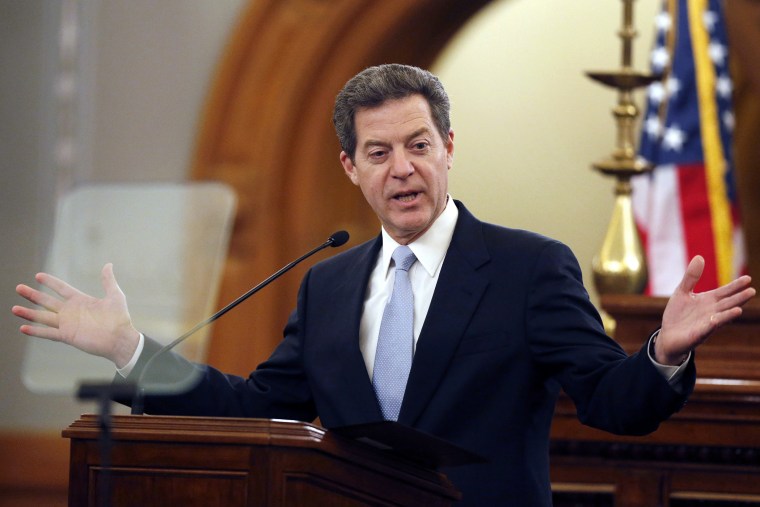When Kansas Gov. Sam Brownback (R) launched his radical economic plan, which cut taxes far beyond what his state could afford, he called it "
a real-live experiment." The governor said at the time, "
We'll see how it works."
More than four years later, we have, indeed. Brownback's plan has
resulted in debt downgrades, weak growth, and state finances in shambles. The
latest data adds insult to injury: "State figures released Tuesday showed that tax revenue came in $11.2 million below expectations in March, the latest in a string of lower-than-expected tax receipts." The report came two weeks after the governor said his plan is "
working."
As msnbc's Trymaine Lee
reported over the weekend, it's reached the point at which some Kansas public school districts are wrapping up the school year early because they don't have the money needed to keep the doors open.
As a result of [Brownback's] cuts, the two Kansas school districts have announced that they'll be cutting their school years short because of an expected budgetary shortfall, including a reduction of state aid and increasing financial pressure. The Twin Valley School District will end its year on May 8 instead of May 20, while the Concordia school district will end its school year about a week short, on May 15 rather than May 21. Concordia schools also will be closed on April 16 and May 1, to spread out the days certain staff won't be paid. "The board's made a difficult decision," Twin Valley Superintendent Jan Neufeld told The Wichita Eagle. "We have just a few fiscal reserves."
Nothing says "21st-century super power" like American schools closing early because a state can't afford to keep the lights on.
Though the governor's office is trying to avoid responsibility for the early school-closings, the
Wichita Eagle reported last week that these districts are "losing $51 million they expected to receive for the current school year after Gov. Sam Brownback signed a school funding overhaul bill in March."
In theory, this might cause state policymakers to take a fresh look at the tax policies that have ruined state finances, but as of last week, Kansas Republicans appear to have a very different priority in mind: imposing
new restrictions on how welfare recipients can receive and spend limited benefits.
Kansas welfare recipients will be unable to get more than $25 per day in ATM cash withdrawals under a new law sent this week to Republican Gov. Sam Brownback's desk by the state legislature. The bill also prohibits welfare recipients from spending their benefits at certain types of businesses, including liquor stores, fortune tellers, swimming pools and cruise ships.
As the
Huffington Post's
report explained, under Kansas' TANF program, a low-income family of three is eligible to receive $429 per month in benefits through government-issued debit cards.
Update/Correction: The Huffington Post ran a correction on this story, explaining that the $25-per-day limitation "applies specifically to ATM cash withdrawals," not overall benefits. The above text has been edited to reflect the change.
